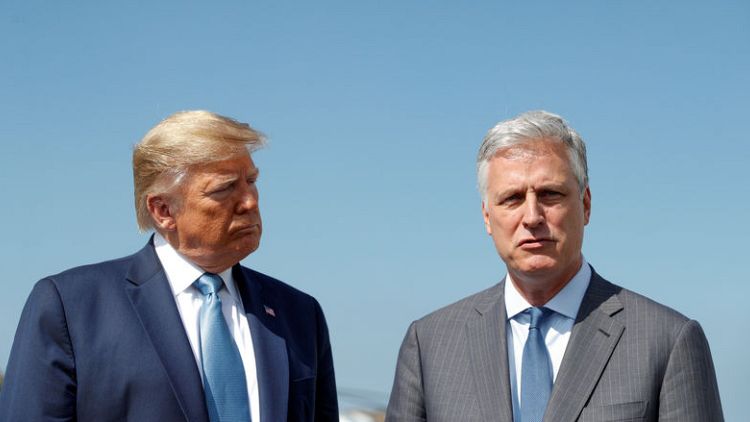By Steve Holland
WASHINGTON (Reuters) - President Donald Trump's new national security adviser, Robert O'Brien, said on Thursday he plans to reduce the size of the National Security Council by about a third in coming months and limit the NSC's role to gathering options for Trump rather than directing foreign policy.
O'Brien appears eager to reinstate the inter-agency coordinating role for which the NSC was originally conceived after conservative hawk John Bolton’s tenure in which he drew fire for not adequately consulting other agencies. Trump fired Bolton last month over strong policy disagreements.
"We’re going to coordinate policy out of the White House, we’re not going to operationalise national security and foreign policy as the NSC out of the White House. That’s the work of the departments and agencies," O'Brien told Reuters in an interview.
O'Brien was the U.S. special envoy for hostage affairs when he was tapped by Trump on Sept. 18 to be his fourth national security adviser, a choice that had the blessing of Secretary of State Mike Pompeo.
A California lawyer with U.N. and State Department experience, O'Brien will have to navigate enormous policy challenges, including Republican backlash to Trump's decision this week to withdraw some U.S. troops from northeast Syria, a move that enabled Turkey to begin an incursion against U.S.-allied Kurdish fighters.
O’Brien has told aides his job is not to tell the president how the world works and what he should do but to ensure he has options. He seeks to bolster the role of the Cabinet departments in crafting policy rather than have the NSC attempt to do it.
He told Reuters he was happy to offer Trump his own national security opinions if asked, but only after the president had already heard from his Cabinet.
The National Security Council has played a powerful foreign policy role over the decades since it was created in 1947 under President Harry Truman.
Some national security advisers have beefed up staff and run foreign policy out of the White House to the chagrin of officials at the State and Defense departments.
The number of NSC policy advisers has trended higher over the past 30 years. President George H.W. Bush had less than 50, Bill Clinton went up to 96, George W. Bush's grew to 136 in his second term, and Barack Obama at one point had 184, according to NSC records.
O'Brien said he wants to bring the size of the White House agency down to 117 policy advisers from its current strength of about 178.
That is about the size the NSC was under the leadership of Condoleezza Rice when she was President George W. Bush's national security adviser during Bush's first term in the early 2000s.
O'Brien said he wanted to follow the model for the job established by Brent Scowcroft, who was George H.W. Bush's national security adviser and who limited the NSC to coordinating foreign policy and making sure the president had all the options needed to make decisions.
MAKE NSC MORE EFFICIENT
O'Brien said he would achieve his goal of reducing the agency's size primarily through attrition. Experts detailed from other departments like Defense and State will go back to their home bases as their details expire at the NSC, with the goal of streamlining the NSC by the end of January 2020.
A senior administration official said O'Brien planned to be careful about bringing new people into the NSC staff for now. He has halted hiring for the time being while sorting out what the agency's needs are.
O'Brien's downsizing is aimed at making the NSC more efficient, not trying to limit the amount of leaks to the news media that have dogged the Trump presidency, the official said.
He has chosen from within the NSC for his leadership team. Asia expert Matt Pottinger is his deputy national security adviser, with Victoria Coates serving as deputy national security adviser for the Middle East and North Africa affairs. His chief of staff will be a former Pottinger aide, Alex Gray.
O'Brien is also taking steps to reduce bureaucratic red tape.
The international economics team will be a bit smaller and managed solely by Trump's senior economic adviser, Larry Kudlow, rather than having both Kudlow and the national security adviser lead it.
"I've got a teamwork approach to working with my West Wing colleagues," said O'Brien. "Larry feels the same way. This idea that there's a dual report for certain staffers doesn’t make good management sense. We are going to fix that situation."
(Reporting by Steve Holland; Editing by Mary Milliken and Peter Cooney)
